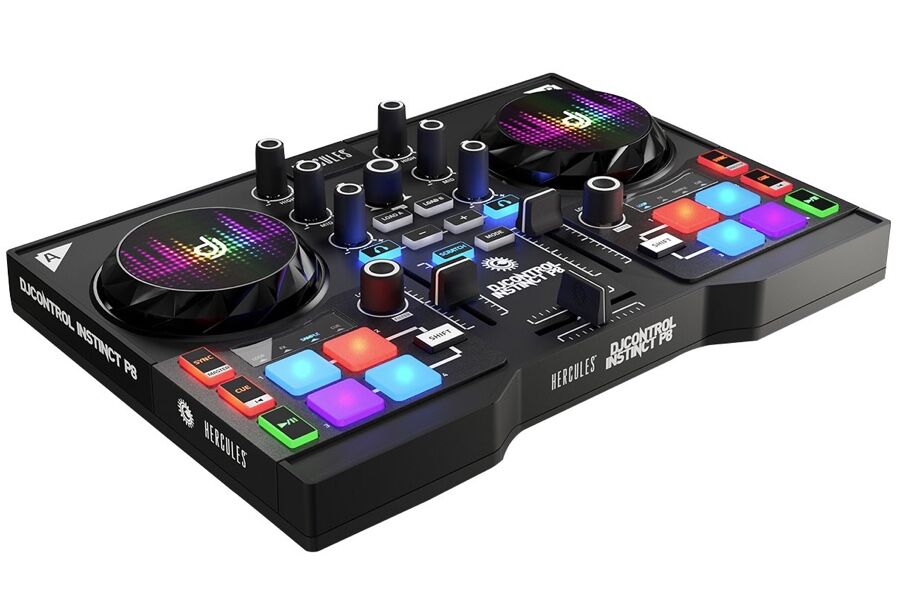The Lowdown
Entry level compact controller aimed at casual users, house parties etc. two mix-channel controller/soundcard with three band rotary EQs, two channel faders, cross-fader, a push-button browser dial and load buttons, sync, cue and play buttons. There’s also a four pad multi-coloured LED backlit Performance section for each channel, allowing control over FX, loop lengths, cue points and sample/loop triggering. The tiny jog wheels may put off more serious users. It can act as a MIDI controller for other software too. An inexpensive way to get started with digital DJ’ing, but very much an entry level product.
Video Review
First Impressions / Setting up
Good news – it’s still freaking tiny! It’s no larger than an iPad. There have been smaller controllers than this, such as the Numark Mixtrack Edge, but that one was a bit too flat for my taste. Personally, this is about as small as it gets for a miniaturised two-channel controller that still has regular-sized knobs and short-throw faders. In fact, the layout reminds me of a shrunken Traktor Kontrol S2 Mk2.
It’s got an 1/8” jack for headphones on the side of the unit, a pair of RCA jacks for the master output, and a mini-USB socket. No power brick here – all you need to do is plug it into your laptop and you’re good to go.
It’s meant to work with DJUCED 40, which is a free download over at the DJUCED website.
I connected the DJControl Instinct P8 to my laptop, hooked up my headphones and speakers, fired up DJCUED 40, and got going.
In Use
Jogwheels
The jogwheels are small and mechanical instead of conductive, meaning you’ll have to press down on the jogs themselves to stop a track from playing, as opposed to just placing a finger on top of them. Rotating the jogwheel allows you to speed up or slow down a deck. To be able to scratch on these jogs, you’ll have to press the scratch button, otherwise the jogwheel serves as a “seek” control, letting you scrub through a track in larger chunks when the deck is stopped.
They’re not the best pair of small jogs on a controller, and they do feel kind of flimsy, but not in a “fall-off-during-a-gig” type of way. In short, they get the job done.
Pads
New to the DJControl Instinct P8 are the four pads per channel. They are on the soft / gummy side, and they’re OK, just don’t expect to do any complex cue point drumming routines with them. These pads change in functionality depending on what mode you’ve got selected for a deck. When you hold the Mode button, all four pads light up corresponding to the four pad modes: Loop, FX, Sample, and Cue.
Loop mode lets you do loop rolls and stutters, FX mode lets you use the pads to turn the effects in DJUCED on or off, Sample gives you control of the Sampler decks (ala Remix Decks in Traktor), and Cue turn the pads into four hot cue points. To avoid confusion, there’s a display above the pads that lights up depending on what mode you’ve currently got selected.
Mixer and browser
There are three EQ knobs per channel, a filter knob that also doubles as a loop control when the shift button is held, and headphone cue buttons with headphone volume buttons (a Hercules signature quirk in these small controllers). For library control, you’ve got a browse button in the middle, plus load buttons for both decks A and B.
Conclusion
I’ve got to admit that it took a while to get used to the less than stellar jogwheels, but apart from that I felt like it was a decent experience: the knobs and faders integrate tightly with DJUCED 40, which is good. I’ve used DJUCED 40 with the Hercules Universal DJ and the Hercules P32 DJ, and while I did like their larger controls, I was pleasantly surprised that the DJControl Instinct P8’s layout didn’t feel too cramped. Sure, you’ve got smaller jogs, but everything else feels pretty standard, which is no small feat for a “toy” controller, and I actually like the plastic faders here more than the rubber ones on the Universal DJ and P32 DJ.
I also liked how easy it is to beatmatch on the DJControl Instinct P8 despite not having any pitch faders: holding the shift button turns the jogwheels into pitch controls, which you can rotate to change the tempo.
I’m not a fan of the fact that you have to press the scratch button to enable scratching with the jogs, but I’m guessing it’s a necessary evil given the mechanical nature of the jogwheels. The upside here is you do get the seek function when scratch is turned off, packing in more functionality to the jogs in lieu of a needle search strip.
Expectations are key here: if you purchase this thinking that you’ll have everything you need to seriously gig at clubs, functions, or festivals, then you’ll be disappointed. The strength of the Hercules DJControl Instinct P8 is that it’s a cheap, fun, compact controller meant for casual use and house parties. For beginners and the DJ curious, it’s an inexpensive way to dive into our wonderful digital DJing world, although you’ll probably outgrow it and it’s not for serious gigging. But if you never reach that stage, then you didn’t shell out an arm and a leg to know that spinning isn’t for you.
If you’re looking for a backup device that you can use for gigging, we recommend getting something like the Pioneer DJ DDJ-SB2 / DDJ-RB, or the Reloop Beatmix 2, which are solid controllers in their own right.
Having said that, I just came from a weekend out of town, and I’m pretty proud of the fact that I played a get-together using a controller that’s smaller than my laptop, which I think is also a testament to how far DJUCED 40 has come as a software. Overall, a fun toy for leisurely use, but for serious pursuits, look elsewhere.


